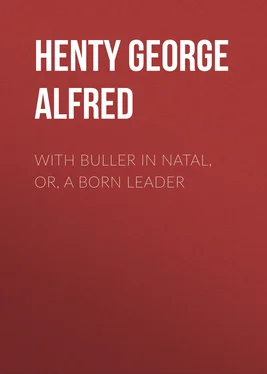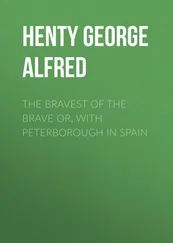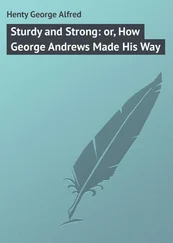George Henty - With Buller in Natal, Or, a Born Leader
Здесь есть возможность читать онлайн «George Henty - With Buller in Natal, Or, a Born Leader» — ознакомительный отрывок электронной книги совершенно бесплатно, а после прочтения отрывка купить полную версию. В некоторых случаях можно слушать аудио, скачать через торрент в формате fb2 и присутствует краткое содержание. Жанр: foreign_children, foreign_antique, foreign_prose, prose_military, на английском языке. Описание произведения, (предисловие) а так же отзывы посетителей доступны на портале библиотеки ЛибКат.
- Название:With Buller in Natal, Or, a Born Leader
- Автор:
- Жанр:
- Год:неизвестен
- ISBN:нет данных
- Рейтинг книги:5 / 5. Голосов: 1
-
Избранное:Добавить в избранное
- Отзывы:
-
Ваша оценка:
- 100
- 1
- 2
- 3
- 4
- 5
With Buller in Natal, Or, a Born Leader: краткое содержание, описание и аннотация
Предлагаем к чтению аннотацию, описание, краткое содержание или предисловие (зависит от того, что написал сам автор книги «With Buller in Natal, Or, a Born Leader»). Если вы не нашли необходимую информацию о книге — напишите в комментариях, мы постараемся отыскать её.
With Buller in Natal, Or, a Born Leader — читать онлайн ознакомительный отрывок
Ниже представлен текст книги, разбитый по страницам. Система сохранения места последней прочитанной страницы, позволяет с удобством читать онлайн бесплатно книгу «With Buller in Natal, Or, a Born Leader», без необходимости каждый раз заново искать на чём Вы остановились. Поставьте закладку, и сможете в любой момент перейти на страницу, на которой закончили чтение.
Интервал:
Закладка:
There was a general chorus of "No fear of that, Chris. We all know you well enough to be sure that we have made a good choice. We knew it before we left Johannesburg, but your pluck in walking up to that Boer with his loaded rifle clenched the matter."
"Well, we shall see," Chris said. "I shall do my best, but, as I said, the moment you want a change I shall be ready to resign; and now I think that we may as well turn in. It is nine o'clock, and we must be up at daybreak. Squads number one and two will each furnish a man for the first watch, taking the first on the list alphabetically. At eleven they will be relieved by two from squads three and four; then one and two furnish the next pair, and so on. Four watches will take us on till daybreak. The two of each squad who will be on duty to-night turn in to the same tent together, then the others will not be disturbed."
The blankets were spread in the little shelter tents, and all except the two men on duty were soon asleep. Chris had a tent to himself, there being an odd number, and an extra waterproof sheet had been carried for this purpose. Before leaving Maritzburg twenty-two poles, a little longer than cricket stumps, had been made under Chris's direction. They were shod with iron, so that they could be driven into hard ground. At the top was a sort of crutch, with a notch cut in it deep enough to hold another of the same size. Twenty-two other sticks of the same length were to form the ridgepoles. Half these were provided with a long brass socket, into which its fellow fitted. The whole, when they were accompanied by the spare horses, would be packed with their stores and spare blankets. At other times each rider would carry two of the poles strapped to his valise behind him.
Chris was the first to stir in the morning. There was but the slightest gleam of daylight in the sky, but he at once blew a whistle that he had bought that evening in the town, and heads appeared almost immediately at the entrances of the other tents, and in half a minute all were out, some alert and ready for business, others yawning and stretching themselves, according to their dispositions.
"First of all, let's put on the nose-bags, and let the horses have a meal," Chris said; "then set to work to groom them. Remember, there must not be a speck of yesterday's dust left anywhere."
All were soon hard at work. The Kaffirs stirred up the embers of the fire, which they had replenished two or three times during the night, hung the kettles again over it, and cut up slices of ham ready to fry. By half-past five Chris, after inspecting all the horses closely, declared that nothing more could be done to them. Then they were saddled, the valises, with a day's provisions and a spare blanket, being strapped on. Then all had a wash, and made themselves, as far as possible, tidy. By this time breakfast was ready, and they had just finished their meal when a party of horsemen were seen in the distance. Rifles were slung over their shoulders, and bandoliers and belts full of cartridges strapped on, and they donned their forage-caps after coiling up the picket-ropes and halters and fastening them with their valises to the saddles. Then they mounted and formed up in line just as the general, with two of his staff, rode up. After saying a few words to Chris, the general examined the horses and their riders closely.
"Very good and serviceable," he said, "and a really splendid set of horses. Of course, gentlemen, you would look better if you were in uniform, but for your purpose the clothes you have on are far more useful. Let me see you in your hats; I can then better judge how you would pass as Boers."
The lads all slipped their forage-caps in their pockets, and put on their felt hats, which were of different shapes and colours. As they had agreed beforehand they at once dropped the upright position in which they had been sitting, and assumed the careless, slouching attitude of the Boers.
"Very good indeed," the general said with a laugh. "As far as appearances go, you would pass anywhere. The only criticism I can make is that your boots look too new, but that is a fault that will soon be mended. A few days' knocking about, especially as I fancy we are going to have bad weather, will take the shine out of them, and, once off, take good care not to put it on again. A Boer with clean boots would be an anomaly indeed. Now, I will detain you no longer."
The only manoeuvre the boys had to learn was the simple one of forming fours. This they had practised on foot, and performed the manoeuvre with fair accuracy. Then Chris gave the word, and, after saluting the general, led the way off at a trot.
"They are a fine set of young fellows," the general said to the two officers with him. "They are all sons of rich men, and have equipped themselves entirely at their own expense. They are admirably mounted, and provided they are not caught in an ambush, are not likely to see the inside of a Boer prison. It says a good deal for their zeal that they are ready to disguise themselves as Boer farmers instead of going in for smart uniforms. However, they are right; for, speaking Dutch, as I hear they all do, they should be able singly to mingle with the Boers and gather valuable information."
As soon as they were fairly south of the town, Chris said:
"Now our work begins. Number one squad will make its way towards the river, and follow its course, keeping always at a distance from it, so that while they themselves would escape notice, they can ascertain whether any bodies of the enemy are this side of it, or within sight beyond the other bank. Number four will take the right flank, and keep a sharp look-out in that direction. Squads two and three will, under my command, scout between the flanking parties, and examine the farmhouses and the country generally. The whole will, as I said last night, maintain a distance of about three hundred yards apart, and each man will as far as possible keep those next to him on either hand in sight."
The two flanking companies starting off, those under Chris separating as they rode off until they were as far apart as he had ordered, and then moved forward. When on level ground they went fast, but broke into a walk whenever they came to the foot of rising ground, and when near the top halted, dismounted, and crawled forward. Each man carried a Union Jack about the size of a handkerchief, elastic rings being sewn to two of the corners. When necessary these flags could be slipped over the rifles, and a signal could be passed from one to another along the whole line—to halt by waving the flag, to advance by holding the rifles steadily erect. Other signals were to be invented in the future. Chris took his place in the centre of the line, in readiness to ride to either flank from which a signal might be given.
For five or six miles no signs of the enemy could be perceived. Most of the fields were entirely deserted, but round a few of the scattered farmhouses animals could be seen grazing, and these Chris set down as belonging to Dutch farmers who had no fear of interference by the Boers, and were prepared to join them as soon as they advanced. Many of these, indeed, during the past fortnight had trekked north, and were already in the ranks of the enemy. Presently Chris, who was constantly using his glasses, saw the flutter of a flag on a hill away to the left, and a minute later the signal to halt passed along the line. It had been agreed that signalling by shot should not be attempted unless the enemy seen were so far distant that they would not be likely to hear.
"What do you see, Brown?" Chris said as he reached the lad who had first signalled.
"There are a good many men and animals round a farmhouse about two miles away. The house lies under the shoulder of a hill to the left, I suppose that that is why the others did not see it."
Читать дальшеИнтервал:
Закладка:
Похожие книги на «With Buller in Natal, Or, a Born Leader»
Представляем Вашему вниманию похожие книги на «With Buller in Natal, Or, a Born Leader» списком для выбора. Мы отобрали схожую по названию и смыслу литературу в надежде предоставить читателям больше вариантов отыскать новые, интересные, ещё непрочитанные произведения.
Обсуждение, отзывы о книге «With Buller in Natal, Or, a Born Leader» и просто собственные мнения читателей. Оставьте ваши комментарии, напишите, что Вы думаете о произведении, его смысле или главных героях. Укажите что конкретно понравилось, а что нет, и почему Вы так считаете.












